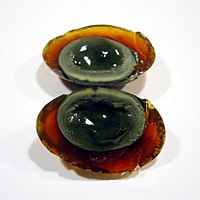
Photo from wikipedia
Salted duck egg yolk (SDEY) is one of the traditional pickled egg products in Asian countries, which suffers from the weight loss and deterioration of texture characteristics during storage. To… Click to show full abstract
Salted duck egg yolk (SDEY) is one of the traditional pickled egg products in Asian countries, which suffers from the weight loss and deterioration of texture characteristics during storage. To better maintain the texture of SDEY, an edible coating based on whey protein isolate nanofibers (WPNFs) with glycerol (Gly) as a plasticizer and incorporating carvacrol (CA) as an antimicrobial agent was developed. Whey protein isolate (WPI, 5%) was used to self-assemble into WPNFs at 80 °C for 10 h. The particle size, zeta-potential and microstructure of WPNFs–CA emulsion were investigated to evaluate the distribution. Results proved that WPNFs–CA emulsion had smaller particle size and better distribution than WPI–CA emulsion. WPNFs–CA/Gly edible coating was then prepared based on WPNFs–CA emulsion. The WPNFs–CA/Gly edible coating exhibited higher antibacterial activity while the WPNFs–CA/Gly film had smooth and continuous surfaces and better transmittance compared with other samples. Furthermore, weight losses and textural properties changes of SDEYs with WPNFs–CA/Gly coating were evaluated. Results proved that salted duck egg yolks with WPNFs–CA/Gly coating exhibited lower weight losses. Textural properties were significantly improved by the WPNFs–CA/Gly coating on SDEYs than those uncoated samples. It was noted that the egg yolks coated with the WPNFs–CA/Gly coating had the lowest hardness increase rate (18.22%). Hence, WPNF-based coatings may have a good development prospect in the food industry.
Journal Title: Foods
Year Published: 2020
Link to full text (if available)
Share on Social Media: Sign Up to like & get
recommendations!